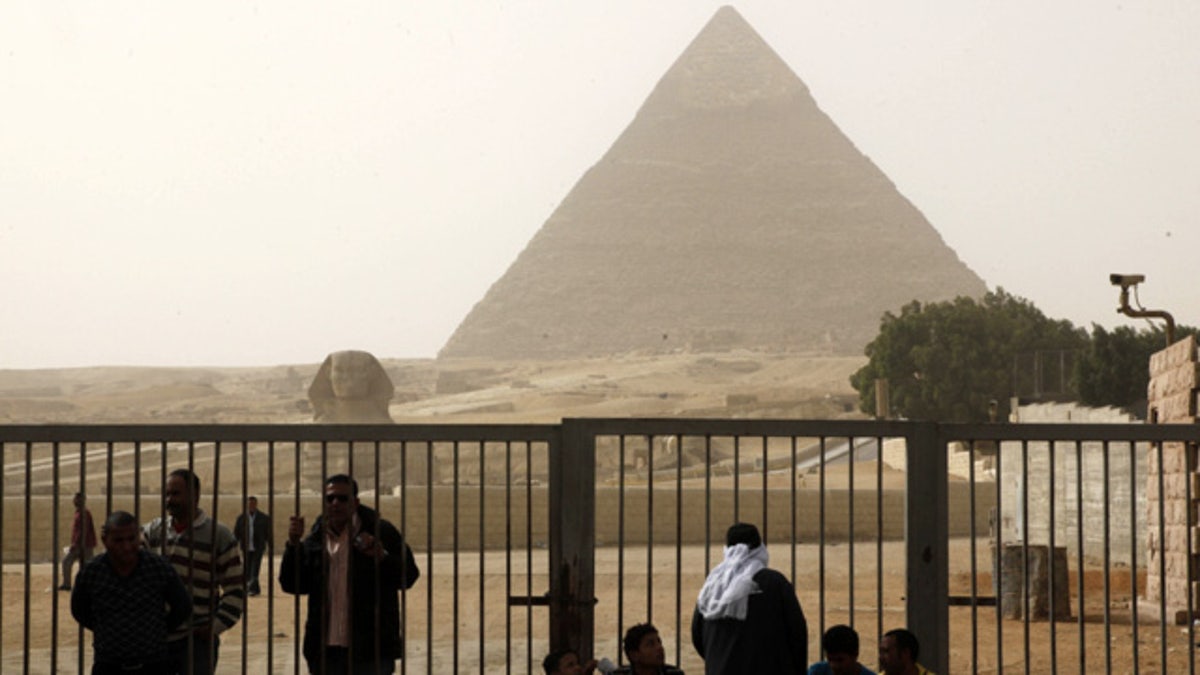
(AP)
The violence in Egypt is already hurting the country's tourism industry, and in turn, its economy. It's also raising fears that other Middle Eastern countries will suffer as well.
Many U.S. travelers have canceled trips to Egypt. Some tour operators are avoiding the country, and Delta Air Lines and EgyptAir suspended flights from the U.S. to Cairo. Stock markets in the Middle East fell sharply during the weekend.
Travelers faced the same question as Rob Solow, who is booked on an Egyptian getaway in February with his wife: "Is it going to be an issue where we are going to have to watch our backs the whole time?"
The Yorktown Heights, N.Y., couple aren't sure if they'll make the trip. But Solow said he won't be going to the Middle East in the future. "I just think it's a troubled part of the world that's not necessary to visit," he said.
The timing of the violence and political uncertainty couldn't be worse — winter is the high season for visitors. Large tour operators such as Gate 1 Travel and cruise companies including Norwegian Cruise Line have canceled Egyptian stops. Tours elsewhere in the Middle East haven't been canceled, but travel agents are getting a steady stream of inquiries about the status of planned trips.
"The ones who haven't booked are holding off, and the ones who have are trying to get out of it," said Blake Fleetwood, owner of several Cook Travel businesses around New York.
Tourism is a major industry in Egypt, a country that struggles with poverty. It accounts for 5 percent to 6 percent of the country's gross domestic product, according to several estimates. Egypt is also often a starting point for people exploring Jordan and parts of Northern Africa.
Cairo International Airport is the second-largest airport in Africa after Johannesburg, handling roughly 16 million passengers a year. Most of them — 15 million a year — are tourists, according to the Egyptian Tourist Authority in New York.
Investors were clearly concerned the turmoil could spread. Dubai's major stock market index fell more than 4 percent Sunday, while stocks fell nearly 2 percent in Kuwait and 3 percent in Qatar. Saudi Arabia's main index rose 2.5 percent, but that was a partial recovery from a 6.5 percent drop Saturday.
Oil prices spiked 4.3 percent Friday on fears that the Suez Canal might be closed. Roughly 3,500 oil tankers a year plus thousands of other cargo ships travel through the canal on their way from the Red Sea to the Mediterranean. After the 1967 Arab-Israeli war, the canal was shut down for eight years. A closure today would add 6,000 miles to trips as ships detour around Africa's Cape of Good Hope. Those trips would risk the threat of attack by Somali pirates.
The region's real economic power player is Dubai, whose airport saw 47.2 million passengers in 2010, according to the Airports Council International. Government-backed Emirates Airlines has also turned Dubai into the region's cargo hub, and FedEx Corp. bases it Middle East operations there.
"To affect the (tourism) industry globally, unrest would need to spread to places like Dubai, which is a major port and air hub. This looks very unlikely," said Ann Wyman, head of emerging market research at investment bank Nomura in London.
Still, Egypt's problems follow political strife in Lebanon, Yemen, and earlier this month, Tunisia. That has led to a general wariness about the region.
Airlines from Arab states lining the Persian Gulf were still flying in and out of Cairo. Some have had to rearrange their schedules due to the unrest and curfews put in place by Egyptian authorities. The Mideast's biggest airline, Emirates, advised passengers to "reconsider nonessential travel" but said it was operating on schedule from its Dubai hub.
John Strickland, a London-based aviation consultant, said the turmoil's effect on the region's airline industry is yet to be determined. EgyptAir is likely to suffer most, and gulf carriers could also face trouble, he said. But Strickland said Emirates in particular has shown it can bounce back following challenges including the Sept. 11, 2001, terror attacks.
It is not clear how long tourists and businesses might avoid the Middle East, and therefore, how much of an impact the situation in Egypt will have on other countries in the area. Jordanian economist Hani Horani said: "Foreign tourists look at the Middle East as one entity and they will avoid traveling to an area they consider unstable."
Tourism accounts for 14 percent of Jordan's GDP. Horani thinks its trade with its neighbor Egypt "will be negatively affected by the turmoil," he said.
Tourism in the Middle East has recovered after wars and unrest in the past. Egypt has had a number of terrorist acts aimed at tourists. A 1997 attack killed 62 people, including 58 tourists at ruins in Luxor's Valley of the Kings. But the violence hasn't deterred visitors from coming to see the pyramids, cruise the Nile River and tour Cairo's markets.
Lebanon's recent political turmoil is likely to scare off Western travelers. But the Lebanese capital, Beirut, has repeatedly proven repeatedly its resilience, emerging from civil war and conflict with Israel to rebuild and live up to its image as the "Switzerland of the Middle East" — a reference to the snow-capped mountains as well as its banking laws.
"People's memories are surprisingly short," said Janet Moore, owner of Distant Horizons, a Long Beach, Calif., travel agency specializing in the Middle East.
For now, though, many Americans are staying away. Moore predicts that 80 percent of her customers who have already booked trips to Egypt will try to cancel. And she doesn't expect any calls for new bookings during the next six months. Moore expects travel to the rest of the region, including Israel and Lebanon, to be hurt too.
"People will fear that the whole region will be falling apart," Moore said. "I think the next year is going to be a quiet one."
Not everybody is so worried. Malaka Hilton owns Admiral Travel International in Sarasota, Fla., specializing in Egypt. The biggest concern for her clients: a government curfew from 6 p.m. to 7 a.m., essentially trapping tourists in hotels.
One of those clients, Robert Kendis, 67, and his wife Hilary, 55, have been planning a three-week trip to Egypt since May. The Cleveland couple is supposed to fly to Cairo on Tuesday but Delta Airlines Inc. has indefinitely suspended flights. If flights resume, the couple is going.
"This is not a civil war. This is a civil protest concerning their government," said Robert Kendis, an attorney. "It's not like they are shooting at each other. It's not like what you would see in Afghanistan or Iraq."








































